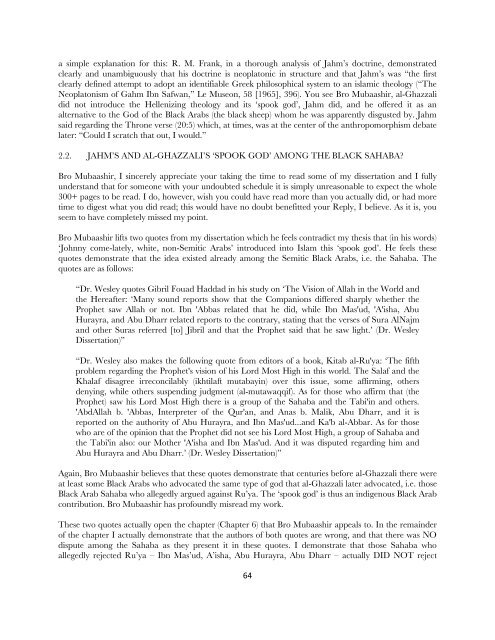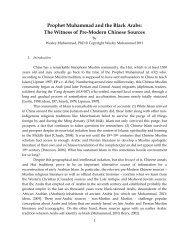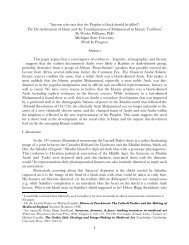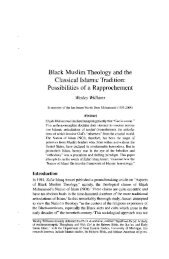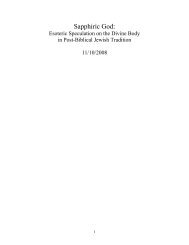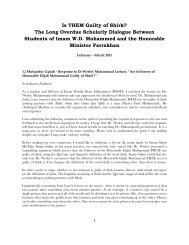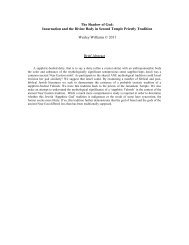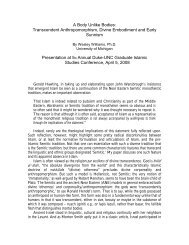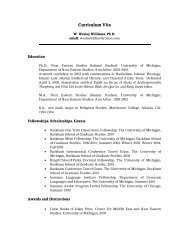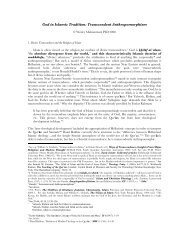Is THEM Guilty of Shirk? - Dr. Wesley Muhammad
Is THEM Guilty of Shirk? - Dr. Wesley Muhammad
Is THEM Guilty of Shirk? - Dr. Wesley Muhammad
Create successful ePaper yourself
Turn your PDF publications into a flip-book with our unique Google optimized e-Paper software.
a simple explanation for this: R. M. Frank, in a thorough analysis <strong>of</strong> Jahm‘s doctrine, demonstrated<br />
clearly and unambiguously that his doctrine is neoplatonic in structure and that Jahm‘s was ―the first<br />
clearly defined attempt to adopt an identifiable Greek philosophical system to an islamic theology (―The<br />
Neoplatonism <strong>of</strong> Gahm Ibn Safwan,‖ Le Museon, 58 [1965], 396). You see Bro Mubaashir, al-Ghazzali<br />
did not introduce the Hellenizing theology and its ‗spook god‘, Jahm did, and he <strong>of</strong>fered it as an<br />
alternative to the God <strong>of</strong> the Black Arabs (the black sheep) whom he was apparently disgusted by. Jahm<br />
said regarding the Throne verse (20:5) which, at times, was at the center <strong>of</strong> the anthropomorphism debate<br />
later: ―Could I scratch that out, I would.‖<br />
2.2. JAHM‘S AND AL-GHAZZALI‘S ‗SPOOK GOD‘ AMONG THE BLACK SAHABA?<br />
Bro Mubaashir, I sincerely appreciate your taking the time to read some <strong>of</strong> my dissertation and I fully<br />
understand that for someone with your undoubted schedule it is simply unreasonable to expect the whole<br />
300+ pages to be read. I do, however, wish you could have read more than you actually did, or had more<br />
time to digest what you did read; this would have no doubt benefitted your Reply, I believe. As it is, you<br />
seem to have completely missed my point.<br />
Bro Mubaashir lifts two quotes from my dissertation which he feels contradict my thesis that (in his words)<br />
‗Johnny come-lately, white, non-Semitic Arabs‘ introduced into <strong>Is</strong>lam this ‗spook god‘. He feels these<br />
quotes demonstrate that the idea existed already among the Semitic Black Arabs, i.e. the Sahaba. The<br />
quotes are as follows:<br />
―<strong>Dr</strong>. <strong>Wesley</strong> quotes Gibril Fouad Haddad in his study on ‗The Vision <strong>of</strong> Allah in the World and<br />
the Hereafter: ‗Many sound reports show that the Companions differed sharply whether the<br />
Prophet saw Allah or not. Ibn 'Abbas related that he did, while Ibn Mas'ud, 'A'isha, Abu<br />
Hurayra, and Abu Dharr related reports to the contrary, stating that the verses <strong>of</strong> Sura AlNajm<br />
and other Suras referred [to] Jibril and that the Prophet said that he saw light.‘ (<strong>Dr</strong>. <strong>Wesley</strong><br />
Dissertation)‖<br />
―<strong>Dr</strong>. <strong>Wesley</strong> also makes the following quote from editors <strong>of</strong> a book, Kitab al-Ru'ya: ‗The fifth<br />
problem regarding the Prophet's vision <strong>of</strong> his Lord Most High in this world. The Salaf and the<br />
Khalaf disagree irreconcilably (ikhtilaft mutabayin) over this issue, some affirming, others<br />
denying, while others suspending judgment (al-mutawaqqif). As for those who affirm that (the<br />
Prophet) saw his Lord Most High there is a group <strong>of</strong> the Sahaba and the Tabi'in and others.<br />
'AbdAllah b. 'Abbas, Interpreter <strong>of</strong> the Qur'an, and Anas b. Malik, Abu Dharr, and it is<br />
reported on the authority <strong>of</strong> Abu Hurayra, and Ibn Mas'ud...and Ka'b al-Abbar. As for those<br />
who are <strong>of</strong> the opinion that the Prophet did not see his Lord Most High, a group <strong>of</strong> Sahaba and<br />
the Tabi'in also: our Mother 'A'isha and Ibn Mas'ud. And it was disputed regarding him and<br />
Abu Hurayra and Abu Dharr.‘ (<strong>Dr</strong>. <strong>Wesley</strong> Dissertation)‖<br />
Again, Bro Mubaashir believes that these quotes demonstrate that centuries before al-Ghazzali there were<br />
at least some Black Arabs who advocated the same type <strong>of</strong> god that al-Ghazzali later advocated, i.e. those<br />
Black Arab Sahaba who allegedly argued against Ru‘ya. The ‗spook god‘ is thus an indigenous Black Arab<br />
contribution. Bro Mubaashir has pr<strong>of</strong>oundly misread my work.<br />
These two quotes actually open the chapter (Chapter 6) that Bro Mubaashir appeals to. In the remainder<br />
<strong>of</strong> the chapter I actually demonstrate that the authors <strong>of</strong> both quotes are wrong, and that there was NO<br />
dispute among the Sahaba as they present it in these quotes. I demonstrate that those Sahaba who<br />
allegedly rejected Ru‘ya – Ibn Mas‘ud, A‘isha, Abu Hurayra, Abu Dharr – actually DID NOT reject<br />
64


